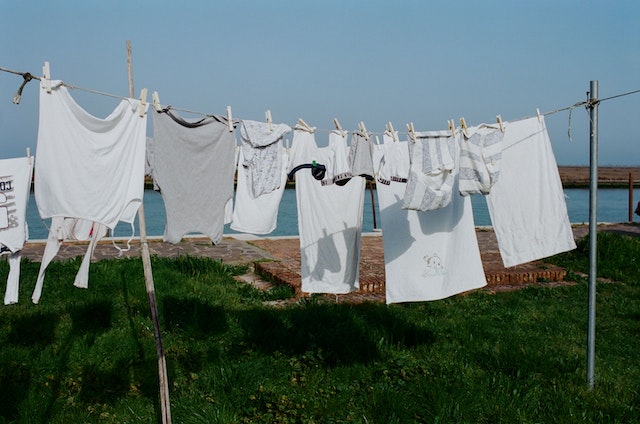Eco-friendly laundry is essential to reduce our environmental impact as we all have to do our laundry every day. From the type of detergent, you use to the way you dry your clothes. Here are some easy changes that will help the planet have an eco-friendly laundry day.
Whether you have a washing machine and dryer set in your home, or you trudge to your local laundromat, it’s impossible to get rid of a pile of laundry that fills up quickly. But keeping our clothes clean has bad environmental effects on the environment.

Scientists recently estimated that the microplastics released when washing synthetic clothes are responsible for more than a third of the microplastics found in the world’s oceans. And a washing machine wash cycle can use up to 40 gallons of water. However, doing laundry doesn’t have to burden the environment. Changing your laundry habits to be more eco-friendly is one of the easiest ways to protect our planet.
Read more: 10 Organic Laundry Detergents That Is Safe For Planet And Your Family
Reduce water usage for eco-friendly laundry
A simple way to reduce water use is to make sure you wash all your clothes instead of just a few items. If the dirty clothes are too small for one wash that day, you can wait until the next day when it is enough. While some newer washing machines are equipped with sensors that measure the amount of water needed for each wash to save water, they still need electricity to operate the machine more often than necessary.
Wash at normal temperature
Heating water for washing consumes more energy. A household could cut electricity as much as 800 pounds of carbon pollution each year by washing four out of five loads of their laundry in cold water, which is enough for most loads. You should only do a hot wash when you need special cleaning of your clothes or if the tap water drops below 40°F during the winter months.
Equipped with a filter to capture microplastics
Synthetic clothing is easy to emit microplastics. If you wash a lot of synthetic clothes, having a microplastic capture filter for both your washer and dryer can help reduce plastic pollution entering your water supply.
Eco-friendly laundry: Choose washing powder
The products you use to clean your clothes are another factor in eco-friendly laundry. More and more companies are offering eco-friendly, biodegradable laundry detergent options. Although it’s a slight improvement, many users will bring significant changes.
Relatively new to the market, laundry sheets are also a good choice for the environment. These laundry sheets containing concentrated detergent are free of plastic, both in their products and packaging. Brands, where you can find laundry sheets, include Sheets Laundry Club, Tru Earth and Kind Laundry, Arm and Hammer. If this option is popular, laundry sheets may become more available at retail stores.
Dry clothes in the air
Clothes dryers, of course, consume energy. To save energy, clothes should be air-dried, on a clothesline. It’s not as fast, but it’s a zero-emissions Eco-friendly laundry option for the Earth.
If you are drying clothes, separate heavy, bulky items that take a long time to dry from lighter items to save electricity. Thick items will take longer to dry than thin ones. Then adjust the drying time for each batch accordingly.
In addition to the energy consumed, the dryer vent also emits volatile organic compounds (VOCs) that pollute the air. Detergent residues along with drying sheets are filled with chemicals that produce emissions that affect air quality. Instead of using those toxic drying sheets to reduce static build-up, consider buying some wool drying balls to reduce static electricity and speed up drying time.

No scent
If you’ve ever passed a laundromat, you’ve smelled a heavy smell coming out the door. While scented laundry products can promise to leave clothes smelling fresh, a strong scent doesn’t necessarily indicate clean laundry, which is bad for your health and the environment.
Those perfumes are a mix of volatile synthetic chemicals that can trigger migraines, allergies, and asthma as well as skin irritation and potential harm to fertility. In addition, some fragrance ingredients are suspected to be hormone disruptors released into the environment, contaminating waterways and harming wildlife.
